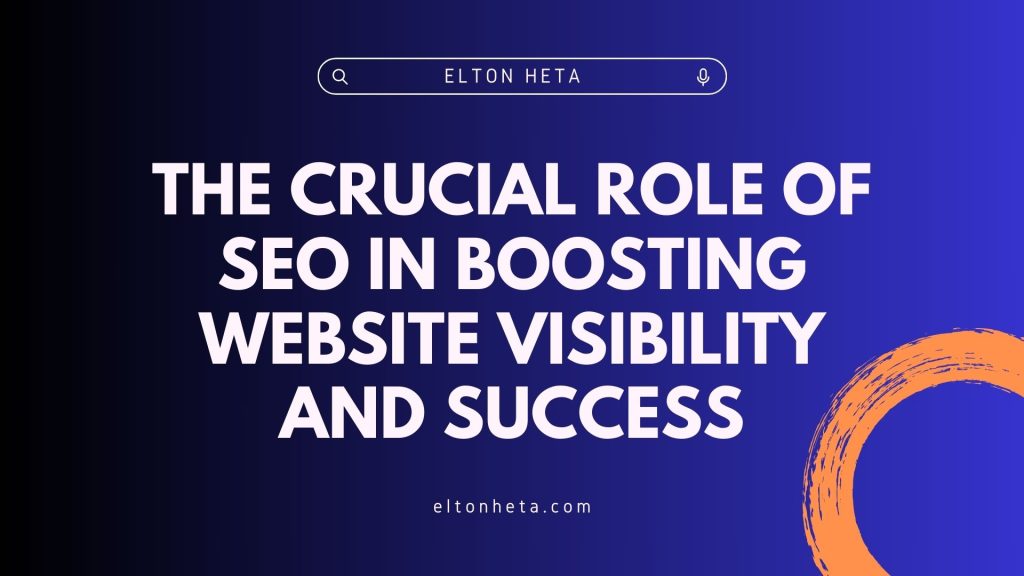In the ever-evolving landscape of the digital world, where online presence is paramount, Search Engine Optimization (SEO) has emerged as a critical tool for website owners and businesses. SEO is the practice of optimizing a website to enhance its visibility on search engines like Google, Bing, and Yahoo. While the concept of SEO may seem complex, its importance cannot be overstated. In this article, we delve into the reasons why SEO is crucial for the success of a website.
1. Increased Visibility and Traffic:
One of the primary objectives of SEO is to improve a website’s visibility in search engine results pages (SERPs). When potential users search for relevant keywords, a well-optimized website is more likely to appear at the top of the results. This increased visibility translates into higher traffic as users are more inclined to click on the first few results. By aligning your content with the search intent of your target audience, SEO ensures that your website is easily discoverable, leading to a steady influx of organic traffic.
2. Credibility and Trust:
Websites that appear at the top of search results are often perceived as more credible and trustworthy by users. This is because search engines use complex algorithms to rank websites based on various factors such as content quality, relevance, and user experience. By investing in SEO, you signal to search engines that your website is a reliable source of information, products, or services. This, in turn, builds trust with your audience, fostering a positive reputation for your brand.
3. User Experience Optimization:
SEO is not just about pleasing search engines; it also focuses on enhancing the overall user experience. Websites that load quickly, are mobile-friendly, and offer relevant, easy-to-navigate content are favored by both users and search engines. Google, for instance, considers factors like page speed and mobile responsiveness in its ranking algorithm. By prioritizing these aspects, SEO contributes to a seamless and enjoyable user experience, keeping visitors engaged and more likely to convert.
4. Competitive Advantage:
In a crowded online marketplace, standing out from the competition is imperative. A well-executed SEO strategy can give your website a competitive edge by ensuring it ranks higher than competitors in relevant search results. Potential customers are more likely to choose a website that appears at the top of the search results, making SEO a key factor in acquiring and maintaining a competitive advantage.
5. Targeted Marketing:
SEO allows businesses to target specific demographics and audiences. By optimizing for relevant keywords, geographic locations, and user demographics, you can tailor your content to reach those most likely to be interested in your products or services. This targeted approach not only increases the likelihood of attracting valuable leads but also improves the efficiency of your marketing efforts by focusing on the audience most likely to convert.
6. Adaptation to Evolving Trends:
The digital landscape is dynamic, with search engines continually updating their algorithms to deliver more accurate and relevant results. SEO is not a one-time effort but an ongoing process that requires adaptation to these changes. Staying abreast of industry trends and algorithm updates allows website owners to refine their SEO strategies, ensuring continued success in a rapidly evolving online environment.
7. Measurable Results and Analytics:
One of the advantages of SEO is the ability to track and measure results. Analytics tools provide valuable insights into website performance, user behavior, and the effectiveness of SEO efforts. By analyzing these metrics, website owners can make data-driven decisions, refine their strategies, and optimize content for better results. This data-driven approach is crucial for long-term success in the competitive online landscape.
8. Cost-Effectiveness:
Compared to traditional advertising methods, SEO is a cost-effective strategy for driving organic traffic. While paid advertising can deliver immediate results, it often requires a significant budget. SEO, on the other hand, provides a sustainable and long-term solution to improve visibility without the ongoing costs associated with paid advertising. The return on investment (ROI) for a well-executed SEO strategy can be substantial over time.

